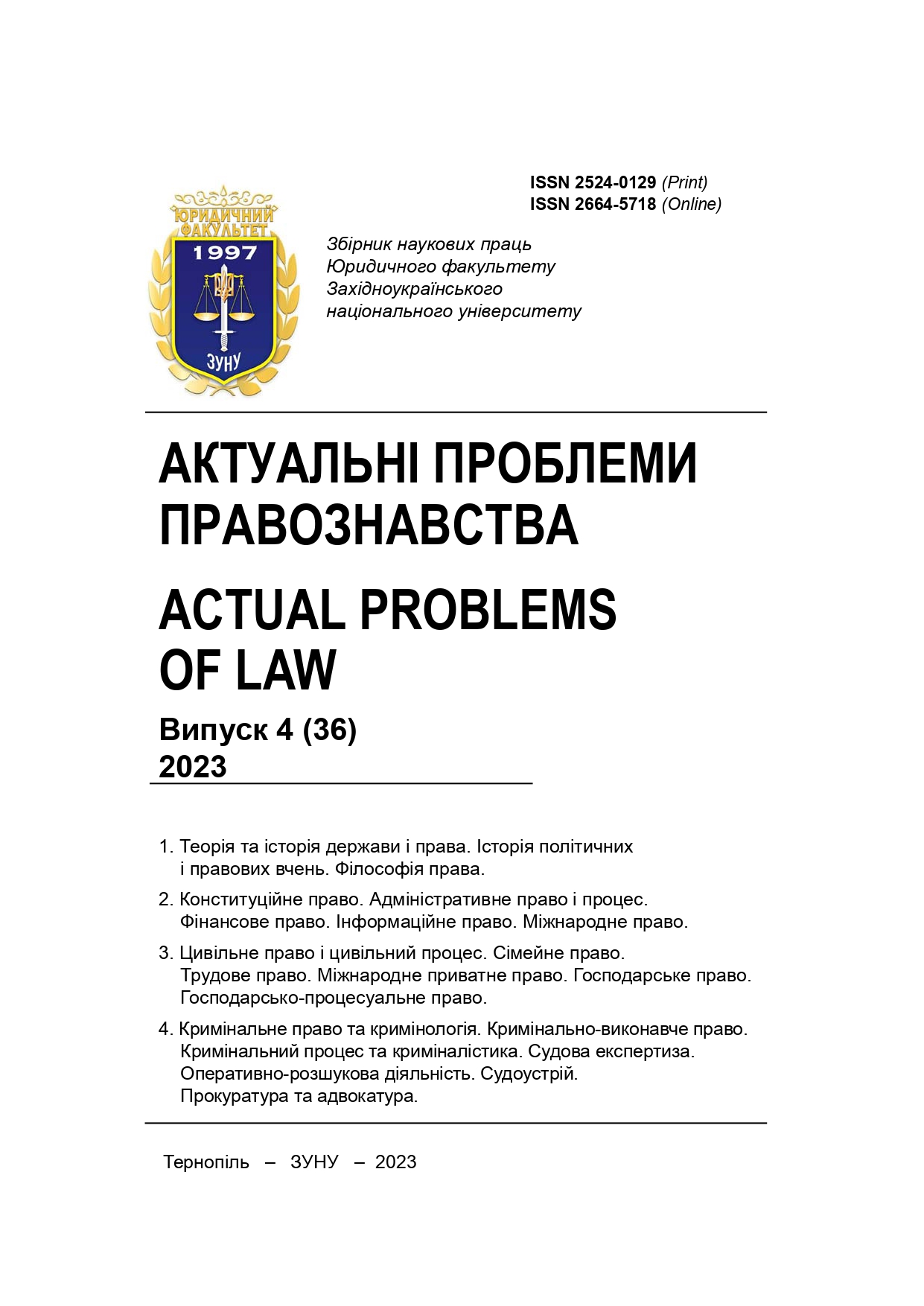PROBLEM-ORIENTED APPROACH TO THE FORMATION OF INFORMATION SUPPORT FOR JUDICIAL AND LAW ENFORCEMENT AGENCIES
Ключові слова:
criminal justice, law enforcement agencies, information-analytical support, problem-oriented approach, information technologies, digital data analytics, artificial intelligence, criminal offender profilingАнотація
The article discusses the use of a prospective problem-oriented approach to shaping the information support for judicial and law enforcement agencies. The rapid development of information technologies is transforming the criminal environment. Criminals increasingly utilize the digital space, leaving numerous diverse electronic traces within it. These encompass personal information, online correspondence, phone call records, media data, browsing history, geolocation data, and more. The task of judicial and law enforcement agencies is to uncover criminal patterns through the electronic traces of offenders and provide timely intelligence information. For the effective processing of data on criminal activities, the use of quality information support by judicial and law enforcement agencies is currently an essential condition. Its formation is only possible through the application of a problem-oriented approach to data collection, storage, and analysis. The efficient operation of modern judicial and law enforcement agencies requires the utilization of cutting-edge information technologies (IT). Such technologies can ensure quality and rapid data management and transform them into useful information for making fair and transparent judicial decisions. With the exponential growth in the volume of information that judicial and law enforcement agencies need to process on a daily basis, the requirements for organizing data repositories and exchanging criminal legal information among different structures of the legal system are increasing. To establish effective information support for judicial and law enforcement agencies, it is necessary to employ new solutions, tools, and methods for data analytics and information technologies, such as artificial intelligence (AI).
Завантажити
Посилання
Shoptenko, S. S. (2017). Zmist ta osnovni napriamky informatsiinoho zabezpechennia administratyvno-yurysdyktsiinoi diialnosti pravookhoronnykh orhaniv [Content and main directions of information support for administrative-jurisdictional activities of law enforcement agencies]. Naukovyi visnyk Uzhhorodskoho natsionalnoho universytetu. Seriia «Pravo» ‒ Scientific Bulletin of Uzhhorod National University. Series «Law», 46, 2, 50–54 [in Ukrainian].
Kovalchuk, Y. (2022). Pryntsypy informatsiino-analitychnoho zabezpechennia diialnosti orhaniv natsionalnoi politsii [Principles of information-analytical support for the activities of national police agencies]. Pidpryiemnytstvo, hospodarstvo i pravo ‒ Entrepreneurship, Economy and Law, 9, 132–136 [in Ukrainian].
Hollywood, J. S. & Winkelman, Z. (2018). Improving Information-Sharing Across Law Enforcement: Why Can’t We Know? Computer Science. Retrieved from ttps://www.semanticscholar.org [in English].
Santos, A., Jenkins, I. & Mariani, J. (2019). Leveraging data for law enforcement insights. Investigative analytics. Retrieved from https://www2.deloitte.com/xe/en/insights/industry/public-sector/law-enforcement-investigative-analytics.html [in English].
Bennett, D. & Brown, K. V. (2018). Your DNA is out there. Do you want law enforcement using it? Bloomberg Businessweek, October 27 [in English].
Mitchell, B. (2018). The FBI is looking to the cloud to stop the next terrorist attack. FedScoop, November 28 [in English].
Trendall, S. (2019). How the police wants to use AI and analytics to ‘adopt a public-health approach to crime. Public Technology, January 15 [in English].
Ferraioli, J. & Burke, R. (2018). Drowning in data, but starving for insights: Starting the digital supply network journey with legacy systems. Deloitte Insights, April 11, 2018 [in English].
Kennedy, J. & Michael, E. (2018). Opioid crisis in America: From digital clues to a murder conviction. Cellebrite training webinar, November 7, 2018 [in English].
Social network analysis for law enforcement. International Association of Crime Analysts, February, 2018 [in English].
Mucklow, A. (2018). Law enforcement consortiums: The new face of records management. Central Square, August 15, 2018 [in English].
Overcoming data challenges in forensic investigations. Deloitte, 2018. Retrieved from https://www2.deloitte.com/. [in English].
Jehangir, B., Radhakrishnan, S. & Agarwal, R. (2023). A survey on Named Entity Recognition ‒ datasets, tools, and methodologies. Natural Language Processing Journal. Vol. 3, 100017 [in English].
Study Finds «Hot-Spot Policing» More Effective When Officers Show Respect. The Crime Report, 2022. URL : https://thecrimereport.org [in English].
Завантаження
Опубліковано
Номер
Розділ
Ліцензія

Ця робота ліцензується відповідно до ліцензії Creative Commons Attribution-NonCommercial 4.0 International License.






